#i think it's important to take shows in their cultural context
Explore tagged Tumblr posts
Text
Lady Boy Friend Is Getting Interesting (at ep 7/16)
Nobody should take this as an endorsement to watch the show, because I think it is really hard to watch for most people and for good reason (it's also hard for me to watch at points). But Lady Boy Friend the Series is doing some really interesting things, and I have to talk about it. It took several episodes before I could get the sense of the overarching plot but now that I do understand what it's doing I'm really curious about where it's going. Spoilers for plot points through to ep7 follow from here.
The core plot of this show is about a class of high school students. The main character is Jeedny, who shows up on the first day of what I think would be equivalent to North American high school (~Grade 10) out of the closet as kathoey, but all of the other kids who are kathoey don't trust her because they've all been out for years and already have their own cliques. So they treat her cattily (they also treat each other cattily, to be fair), and she responds badly by pranking them. She starts desperately grabbing for attention; first by trying to fit in, and when she's rejected, she tries for attention by standing out, and it's not taken well by her peers. Finally in this episode it got to a point where the other kathoeys in her grade have banded together across clique lines to ostracize Jeedny, and it all comes to a head when she finally admits that she's been shitty to them but that it was in response to being rejected in the first place. Everyone apologizes to her but says they'll just stay out of her business, and she's left alone again which is the opposite of what she wanted.
Meanwhile the boys in the class have their own drama. There is a playboy (Jet) who starts flirting with another boy (New) who is cautious but enjoying the attention. It takes a few episodes of concerted flirting to get through that Jet is seriously interested and not just teasing him, and New starts to believe that maybe this could be real. They have sex, and then Jet ghosts New. When New tries to confront him, Jet acts totally disinterested and says he's just not into him like that. New is heartbroken and Jet is clearly discomforted by that; when New starts emotionally distancing himself from Jet and showing disinterest, that discomforts Jet even more. Jet keeps trying to get New's attention back but New's not having it, and he calls Jet out on his bullshit. Jet's own friends also call him out on how his actions differ from his words and how he seems to be leading people on, both New and the girls he dates, and how uncool that is. Jet seems to be unable to leave New alone.
I appreciate that this series is wrestling with in-fighting, cliques, how difficult it can be to get past queer gatekeeping, and how we band together against what we see as a threat. I also love how it's getting in how isolating that can feel if you're on the other side of it, and how difficult it is to come at your queerness at a different age than your peers (even though Jeedny is still so young!). I love that this show has a plotline around "straight" fuckboys and the very real games they play. I appreciate that in the conflict between the kathoey characters, nobody is in the right.
We're only just about halfway through the series, and I still don't have a a sense of what the back half of the show is going to be about (it could all still fall apart), but for now, now that the first half has crystallized into a plot I'm enjoying it. Even when these characters are being awful to one another it feels very familiar and...comforting, in a way. Sometimes I miss being in queer spaces and need to hear people insult one another for five minutes and then offer to throw hands at any outsiders who so much as look at the person they were just insulting with their whole chest.
So why am I not shouting for people to go give this show a try? There is a lot of Thai humour (more specifically the brand of Thai humour that reminds me of older series like Make it Right and Diary of Tootsies) in this show that doesn't necessarily land well, because it's based in puns which just don't translate, fatphobia, colourism, toilet humour, sexual aggression against men as comedy, etc. There are parts that I find hard to watch, and parts that I find boring. There are some scenes that I just don't know what to do with, e.g. when one of the boys is asked to provide a sperm sample for their science class to look at under a microscope. The acting is very uneven, quality of the cinematography, colour grading, sound, and other production elements are low budget. The translation is also lacking, which makes watching all that much harder.
A lot of the comments on MDL are about how this show feels transphobic and I can see why they'd say that, especially in the early episodes. The kathoey characters can come across like caricatures rather than people, especially at first (some of this I chalk up to these characters being young and trying to establish their identities; this does also improve as the show goes on), and the joke seems to consistently be that none of them are attractive or likeable to the male characters (possibly also improving as the show goes on, we'll see). There are many ways in which it's not a good show. It is about the ways we can be terrible to each other even as it's also about how we can hold each other up, which is understandably not something people necessarily want to watch. I really struggled at first, and even as it's become more clear what the show is doing, there hasn't yet been enough of a turn to get fully away from the parts that are difficult, and I'm not expecting the show to ever fully stop being difficult for me at times (it would be unrealistic to expect this show to become something completely different from what it is).
But even with all of that, I'm tentatively excited by the themes it's exploring and wanted to share.
#lady boy friends the series#bl meta#typed so that i can stop thinking it#who knows how this will end up in the end#but i'm enjoying what I think it's trying to do#also just to say I feel like I'm not placed to judge what parts of this show are or are not offensive#i think it's important to take shows in their cultural context#that's why I'm not describing this show in terms of being problematic or bad but rather in terms of landing badly#i struggled a lot with how to write this post#long post
11 notes
·
View notes
Text
Details That Convey Intimacy

Developing fictional relationships that feel authentic takes more than dialogue and grand gestures. Every detail below can be used to show platonic, familial, agape, or romantic love depending on context.
cooking a meal for someone, bringing them food, or spontaneously sharing a snack
sharing body heat/warming someone with outerwear like jackets and scarves
fanning them with something if overheated
getting a cold/hot drink for them
offering to carry something, whether it's heavy or just a jacket, to lighten someone's load or free up their hands
more below the click!
changing the subject of a group conversation that will be personally discomforting to someone in the group
making sure to include someone in a group conversation, especially if it's a topic they have special knowledge of
waiting for someone to catch up when the rest of the group has walked ahead
remembering preferences/allergies ahead of time when preparing/ordering food
planning trips, whether in a pair or as a group, that provide something positive for every individual to enjoy
procuring personal healthcare items like sunscreen, moisturizer, lip balm, pain relievers, or a snack and keeping them on hand for that friend who frequently needs them
making room for someone in a crowded vehicle or on public transit
making room for someone under an awning or in another limited space to help them avoid bad weather
warning or wordlessly covering for someone with a wardrobe/cosmetic malfunction
remembering a small luxury someone mentioned they enjoy, and getting it for them the next time it's convenient
running an errand for someone to make their day easier ('importance of errand : depth of relationship' ratio should be explored)
escorting someone to safety in a sudden unsettling event
escorting someone who is drunk, sick, infirm, injured, or emotionally compromised
asking if light, noise, or other sensory factors are bothering someone and taking steps to make them more comfortable
getting gag gifts for someone to show you reciprocate their sense of humor or quirky self-expression (not everyone does this, not everyone appreciates it, and some people predominantly express love through humor and gag gifts; works well with some characters more than others)
holding someone's hand or arm as reassurance, especially when they are afraid*
using their body to block someone from wind, rain, or heat
picking up a dropped item, or carrying a train or other dragging garment for someone else
returning a recognizable possession to someone who may have lost it
This is an inexhaustible list as humans have many ways of showing love for each other. If you are writing spec fic with non-human characters, you can play with variations on these by remembering three core values the "lover" has to consider:
physical comfort of others
emotional comfort of others
social reputation of others
I'd add "sensory comfort" though I think it's tied to physical and emotional comfort.
Please do not try and force any of these into the mold of the misogyny-based "Love Language" trend. Human emotions and expressions of love are diverse and endless.
*While hand holding can be construed as romantic, in reality it varies. Some cultures do not see this as romantic, and some individuals only mean it as a sign of support or compassion. Same goes for long embraces and kissing, both can be done platonically and of course naturally between close family members or friends.
---
HEY! Writers' Links
Tip Jar! If you enjoy my blog and advice, support me on Ko-fi!🤗
Follow me on AO3 for fanfiction
Visit my Pinterest & Unsplash for visual inspiration
#writing#writing tips#writeblr#writing love#romance#character development#character creation#writing blog#writing advice#writing help#writing ideas#og#writing prompts
4K notes
·
View notes
Text
so... i'm seeing a lot of activism (like, actual activism, not just tumblr posts--letters & scripts to us senators, for example, copy written for press, etc) focusing on improving ventilation & filtration as primarily an access issue for immunocompromised people. basically, presenting the argument as "this is in service of this demographic, who is blocked from public access currently."
this is like. true. of course. it is the main reason i want clean air and i think it is the most pressing reason overall for it. but i think it's the wrong tack for building a clean air movement and getting legislation passed.
like, unfortunately, the vast majority of people in power--and of americans in general, tbh--are not immunocompromised and do not have immunocompromised roommates or family members. should you have to have this experience to understand that public access is a big fucking deal for, like, staying alive? no! you shouldn't! but most people straight up will not understand whatsoever unless they have personal experience with immune compromisation.
trying to change hearts and minds to have cognitive sympathy for disabled people takes a long time, decades' worth of work to just change a handful of people; meanwhile, getting legislation passed is 1) imminently important, 2) while still a lengthy process, takes significantly less time if it doesn't hinge on first converting the majority of the population to have sympathy for a marginalized demographic they have no contact with (and yes, they have no contact with us because we are barred from public access to begin with, again, i am aware of how fucked up this is).
here's some arguments for passing clean air legislation that are designed to appeal to a normative, conservative-leaning crowd:
air filtration is a public health and sanitation baseline just like running water. we provide clean water to drink and wash our hands in as a baseline for public life; we should also be providing clean air to breathe similarly.
improved ventilation and filtration in schools results in less sick days for students, meaning better attendance and less time off work for parents.
improved ventilation and filtration in the workplace results in workers taking less sick days. it also makes it less troublesome when a coworker comes in sick; it's less likely you will have to take sick leave as a result.
improved ventilation and filtration in hospitals, doctors' offices, etc, helps combat the health care worker shortage by reducing the amount of sick leave health care workers need. it additionally makes hospitals safer overall; for example, it makes it safer for cancer patients to be in the same building with patients with highly infectious airborne illnesses such as chickenpox.
improved ventilation and filtration in public buildings at large could improve the economy, as less workers stay home, more people enter the workforce, more people begin attending public businesses like bars and venues, etc.
if government programs to upgrade ventilation and filtration are created, this could create jobs for blue-collar workers, further improving the economy.
the last note i have is that, as much as this sucks shit, don't mention covid as much as you can avoid it. covid has become a massive culture war thing in the usa and as soon as you bring it up, the entire discussion becomes about virtue-signaling and showing in-group affinity--it doesn't matter what you're saying about covid, anyone who thinks "covid is over" will immediately shut down and become incapable of listening to anything else you have to say. and unfortunately, a majority of the population does, in fact, think covid is an irrelevant concern even for immunocompromised people in 2024.
importantly, all general air sanitation improvements will improve the covid situation significantly. in this context, you do not have to talk about covid in order to make real, material changes limiting the spread of covid. system-level changes that limit the spread of things like the flu and chickenpox are equally effective in limiting the spread of covid. take advantage of that!
3K notes
·
View notes
Text
One piece of acting advice that has stayed with me for years in regards to both writing and drawing as well is: "Don't use the body to act what the character is saying. Act what the character is THINKING."
Like, as a very, very basic example: a character is apologizing by saying, "I'm sorry." But that line is going to look and sound different depending on what the character is thinking. Crossed arms and a sullen tone can mean that a character is actually thinking: "I don't mean it and also I hate you." A pleading tone and reaching out to take the other character's arm can mean: "Please don't leave me." A tired voice and slumped shoulders within context could mean: "I did what I had to do."
This is one way to begin to do "Show, Don't Tell" in storytelling. It is trusting your audience to see the depth and to catch on to the things you leave unsaid. It's fun to let the audience be observant and clever. It is also reflective of real life, where people are often scared of being vulnerable, or don't necessarily even understand their own emotions, or can't articulate their own thoughts, or have difficulty identifying the true feelings of the people around them, and so don't say very much.
There are exceptions to this advice, of course. In writing especially, rather than in a visual medium, some POV characters are very good at reading emotions from body language and others are not, and their observations in the narration may reflect this skill. Some characters will assume everyone around them is always angry with them or simply not pay attention to other people's moods at all, personalities which can also be subtly communicated to the audience and later used in the story in some interesting way.
Some characters have excellent control over their body language and tone of voice, because they are on-guard, highly trained in some fashion, or a very good liar. They will not easily communicate their true thoughts through their body language or their actions. Their lie can be so good that it can be slipped past the audience as nothing important to the plot until it comes back to bite. Their oddly perfect control over their body in a tense situation can instead maybe be used to indicate to the POV character and/or the audience: "Oh, there's something up with this person."
Body language will also change by culture and class and disability and so on. This clash can cause communication problems between characters, as a character's affectionate pat on the shoulder of another might be intended as casual comfort, but be received as overly intimate condescension. Different cultures / people can even have very different opinions on what level of eye contact and overlapping speech is rude.
This advice was originally given to me in the context of illustration and animation, in which it is very common for inexperienced artists to act out the words that the character is saying in mime-like gesture. In media for young children, we might choose to keep things very simple, as toddlers struggle to learn what it looks like and feels like to be angry or happy. But past that? People don't really behave this way. What we say and what we really mean are not always synchronized, and we can use the body to communicate this.
3K notes
·
View notes
Text
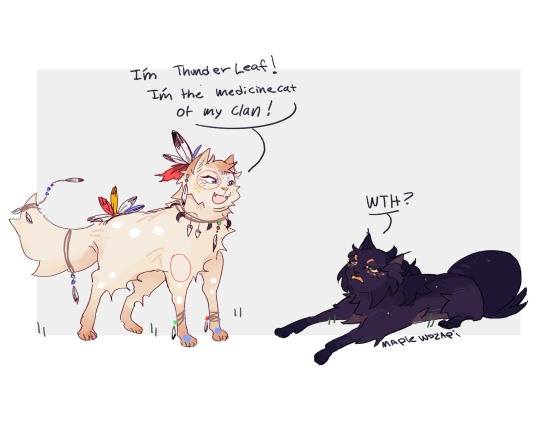
I should have known if I brought up wc I’d have to talk about. But it includes of a lot of issues with feral/furry designs that use feathers in hair. I don’t necessarily know why the conversation only started and stayed in the wc fandom when horse/wolf/lion feral fandoms are still doing the same thing.
Now having feathers in the design isn’t a racial attack first thing off because there’s a lot of context around what feather’s are used, the shape, and where they are placed. If the look is anything like "rave Coachella looking tribal fantasy feathers and beads" it’s probably insensitive. I’m not to sure why it has to be feathers, I honestly think the wc fandom are holding themselves back when it comes to forwarding designs in a unique way. Tail feathers are also left out in this conversation as well, one or two feathers or feathers in the shape of a birds tail are fine but bunched together feathers are leaning to close to how we have our horses wear feathers. This is in the context of the design already looking like a "medicine cat" already its bad. it’s like those yt girls wear feather head bands but animal addition.
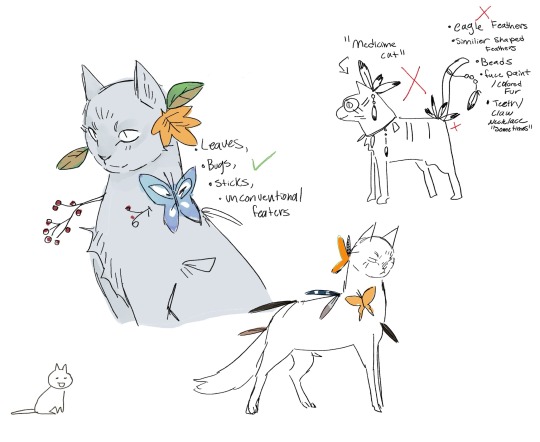
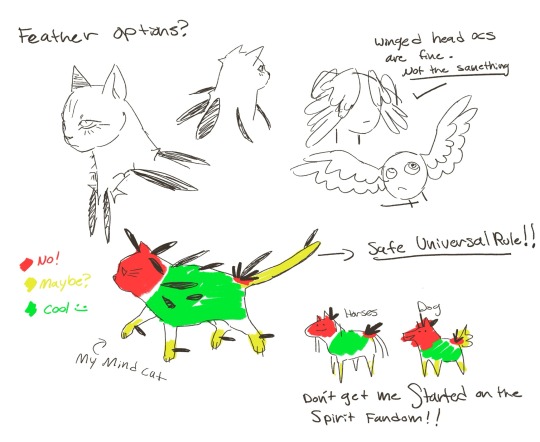
I’ve talked about this before but silhouettes are so important, like Native American stereotypes are on the global scale you cannot escape this silhouette you just have to avoid it. There’s no "but it’s in so many other cultures" no it’s not it’s totally unique to our people that’s why people flock to it because it’s so "mysterious, sacred" whatever their weird twisted up reason is. There’s so many unique ways to break this silhouette you just gotta be more creative. And I feel like instead of being more creative and coming up with totally different ideas it’s just easier to lean on these visual native stereotypes to get across "wild mythical nature fantasy"
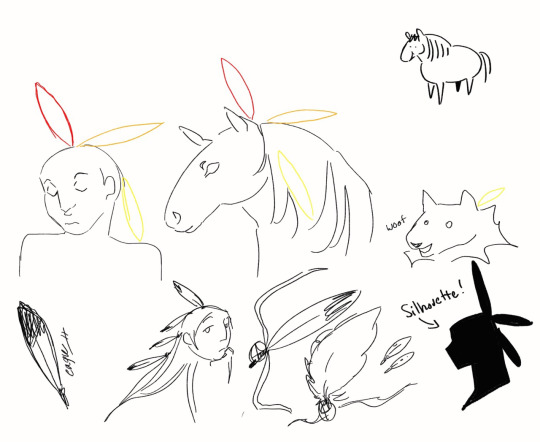
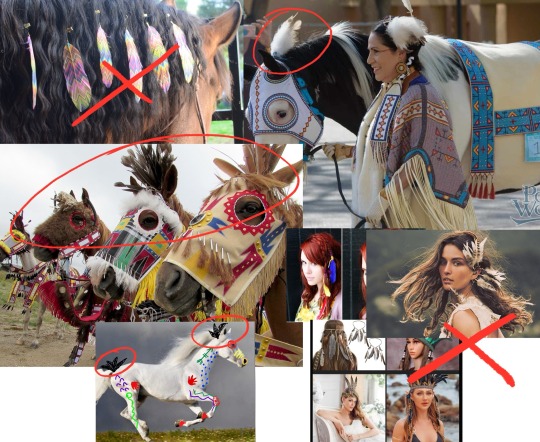
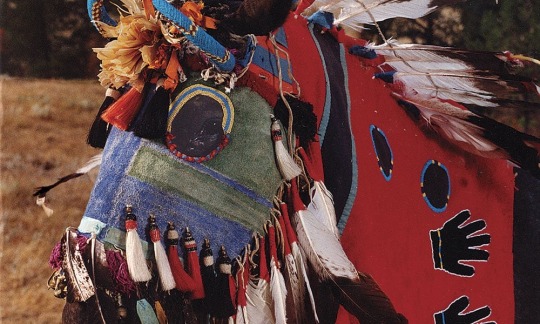
I could get into the horse fandom and the weird situations they��re doing over there but that’s another crazy thing. I should say because someone will ask, ostrich feathers on like show horses or knights or puss in boots style is fine not the same thing (breaking the silhouette) they’re not related.
And it comes down to understanding what you are drawing and where this imagery comes from, I’m not gonna get my feelings hurt because of your design but I’ll question why are you drawing stuff like that. You cant remove that cultural/stereotypical imagery, and if you don’t care about it then you don’t care about the history or how it looks on your character and art.
I made it this far on the internet but if you want to be conscious about these things good on yea it doesn’t take much☺️👍
Edit: can’t believe I gotta say this but yes other cultures utilize feathers, if people are using feathers that are used in their culture then don’t harass them. That’s weird have some common sense. Ostrich feathers, peacock feathers it’s actually so interesting how native birds to an area affect the culture there.
#native artist#ndn tumblr#native american#indigenous#warrior cats#warriors oc#warriors#warrior cats oc#spirit stallion of the cimarron#furry#feral
5K notes
·
View notes
Text
Shut up i'm talking patreon only 7$!!!!!
The patreon podcast is out, and I have just finished listening to it!
I decided to write down some notes for those who are interested but do not have the patreon. It's a long one, but I picked out what I thought would be important + silly moments here n there
Podcast is recorded the morning of Dream's video (I'm sorry but not to Tommyinnit)
Tommy called his mom about the situation first, discussing about how it was awful (pre reddit post)
Harry wrote the "you can call me anything but do not call me poor" LOL
Tommy didn't watch the dream stream but read a synopsis, and he said that was enough
He's spoken to Dream privately several times (starting 2023), all his friends told him that dream was taking advantage of him, but he wanted to give him the benefit of the doubt
He has told dream to change how he acts, and dream has refused. Has had conversations like this multiple times.
Told dream in a conversation he was no longer speaking to him and was no longer talking to him after he talked to his mom. Was previously ignoring him but blocked him outright.
After his dream v quackity sketch dream sent him awful and mean messages.
Jack and Tommy are pissed off about people saying to "resolve it privately". They have tried multiple times to solve things privately, but Dream will take things public.
Jack had a 2 hour long call with dream on jack's DADS BIRTHDAY??? and it was about why he didn't like dream, and about dream's allegations.
the "Jack mentions Dream" account bothers Jack since its a bunch of indirect things, and him responding to messages rather than him just bringing Dream up.
Dream says Jack spreads rumors about him.
Jack does not think dream is a p*dophile, but he finds the situation(s) he was in wildly inappropriate.
Dream showed everyone his evidence against the grooming allegations in the DreamSMP discord. Jack said he told Dream it weirded him out, because either way, he was still messaging a fan, and it pissed Dream off.
Jack flat out calls Dream "stupid".
He's very pissed about the "unfaithful" rumor, and he's very vocal about it for a minute.
Jack reiterates the editor story with the 50 quid
They point out how the Dream ignores the George and Caiti situation, along with clipping Tubbo out of context.
"I can't believe he thought he could win by just lying. Especially when you've got a reputation of lying." -Jack (paraphrased/two different sentences put together)
Tommy says the video were for him, not everyone else. Makes a jab about Dream unable to use media literacy.
Tommy says Dream knows what he's talking about when he refers to misogyny. That there's so much more behind the scenes, that it's miserable.
Tommy says he doesn't want to do any of this anymore, that it's pointless. He says Youtube doesn't make him happy, that he doesn't fit in, and he wants to be done. He will still be posting to Youtube because he loves making videos, but he doesn't want to be part of the Youtube sphere/culture. He wants to be a proper comedian.
"I might as well go down sayin' what I fuckin' mean." -Tommy
brings up the "putting others down", Tommy reiterates how he's been very kind/warm to everyone, but if someone famous is being an asshole he's gonna make a joke about it. "That's what I've done with Logan, done to you, and what I'm going to continue to do."
Tommy calls him one of the most self indulgent and exhausting people he's ever met.
Brings up Dream calling him the internet police, he says that he's just sick of the bullshit. "When I see it, say it."
Tommy reiterates he can't do this much longer, that it's all pointless. Dream is just doing what he's been doing for years. He is not proud of dream and he doesn't respect him. Tells him straight to "Fuck off".
Tommy would talk to Jack, unsure if what was happening with Dream was odd/bad or not. He's a little relieved that it's in the public eye now.
Jack talks about how everyone on the server is talking against him, that no one is defending him. They've all known he's awful.
Tommy says he felt close to Dream, so he struggled with seeing the bad actions he had done. He felt skewed/manipulated.
Tommy tells a story about back when he was 14, he would annoy people in Hypixel by lobby spamming. One day he heads into a streamer's chat that he looked up to and said hello. the streamer, who was about 20 at the time, tore into him, calling him the R slur and many other horrible things. He said he felt heartbroken and shaken up. "Shit like this just happens along the way, and it's miserable, but like- for me, I just keep remindin' myself "this isn't the first time I've done this"."
Jack tried to make his disassociation as public as possible, he had told Dream to his face (during the allegations) in the DreamSMP discord that he did not want to be associated with him anymore.
Talks about how people still group DreamSMP members with Dream, and how they think every member is bad due to Dream's actions, and he's tired of it.
He doesn't like how public everything is, but he's glad people can finally see that they don't like Dream.
Tommy, from now on, is telling everyone how he feels. He's going to be blatant. (if that's what i understood from a comment he made)
Jack is still shocked that Dream chose that moment of all things to jump in. They have made comments here and there but Dream never said anything.
Jack talks about a part in his stream where he says something along the lines of "I'd understand this type of outburst if we had been bullying im for weeks and weeks. But we haven't been. Nor would that make it okay." And then someone on twitter said "Jack just admitted that they'd been bullying Dream non stop for weeks and he's proud of it!!!!" Jack says he can't believe people's ability to misinterpret.
Tommy saw Tubbo dissecting Dream's stream for 7 hours and knew that was the point it was becoming ridiculous.
Jack blatantly calls out how Dream uses manipulation tactics in how he speaks to the public. Tommy calls it painful for him to watch because it's what Dream had done to him and others in private.
Jack goes back to Dream's stream, talking about their phone call together, about how it was disingenuous and weird to bring up publicly. He says there are things he can't talk about publicly that formed his opinion.
"I just think he's like an impossibly self-indulgent, selfish man, who thinks everyone's on his own time." -Tommy
Jack thought Dream was purposefully being negligent in the way he would speak, and while he still is, he is seeing that a lot of it also comes from Dream not being able to pick up on social cues and norms. Though, he also reiterates that it doesn't excuse his awful behavior.
"I don't get how he can't listen to anyone else." -Tommy
Both of them have talked to Dream multiple times about how he acts and he never listens. Not even just them, they say "We all have really tried", which implies more members of the SMP or other personal friends.
"He doesn't seem to feel very much empathy for the pain he's caused, and if I was in his shoes- I don't know where his guilt is." -Tommy
They talk about his inability to apologize and how they can't understand it. Tommy gets a little heated. Dream has given them empty apologies and goes to do the same things again. They talk about how he doubles down over and over until no one sides with him, that's when he apologizes.
Jack calls Dream dismissive, and how its obvious that he doesn't care.
Tommy implores the audience to not imagine these dramas as Youtubers doing it, but to imagine their friends doing these things. Youtubers are not above others, there's no difference. The only difference is responsibility.
Jack points out how it's odd that they decide to post these things. It shows that they just double down on their awful actions.
Tommy ends by saying he doesn't want to continue this, but if there are things that need to be said then they will be, but on the Patreon.
Jack says he is done as well, that he's done with all his serious points, but he will be making jokes here and there. He won't be joking about rumors, but things that actually happened.
"Anyway, back to writing!" "Guys, let's all get back to coding."
694 notes
·
View notes
Text
being a POC in the Marauders/HP fandom is really interesting to me because it seems and feels like a really predominantly white space, which, hey, nothing new! and that does come with some challenges. for the most part, they're fairly under the radar.
it's things like being able to count the POC in a discord server on one hand, even though there's 100+ people in the community.
it's people not taking into account racial dynamics whether that be in a fic, or in a tiktok, tumblr, whatever. there are innate power imbalances in our society (regardless of what country you live in) and to assume because this fandom is a largely open, liberal and leftist space, that they don't carry over to fandom, is exceptionally naive. buuuuut, we live and learn, so people can and should be given a certain amount of grace. but what is unforgivable is to have them pointed out to you and for you to dismiss, ignore or belittle them. Not only that, but you as a white person, do not get to be the forgiving voice to another white person when they make one of these mistakes. please please please respect and understand that.
there's also (and i'm sorry if this is controversial and frankly it makes me really nervous to even write this), a trend of assigning ethnicities, cultures and races to characters in stories without having a proper understanding of them, or having a particular reason for doing so. I'm never going to sit here and say "you as a white person shouldn't write about ____ race!", because I don't believe that. but what I would really, really love to see, is for white creators and writers to ask themselves some questions beforehand:
what does the race of this character add to the story outside of me chasing clout with a particular group of people/is it necessary for me to be writing the lived experience of a culture/ethnicity I've never taken the time to learn about?
if so, why?
am i the right person to be doing this?
are my actions outside of my writing towards these POC reflective of this?
i also think it's really important to remember that unconscious bias is a thing, and it's really easy for us to spot in your writing if it isn't something you've addressed. Not only that, but even if you write the most well-researched POC in your fic, even if you're sharing posts about Lebanon and Palestine, none of that matters if your actions when interacting with us show us that you are indifferent to the power dynamics at play with you being a white person, often with a large audience, in this space. virtue signalling is spectacularly unhelpful if you're writing checks your ass can't cash.
that being said, I think throwing 'racist' around as a term at people who make mistakes is really unhelpful. because every situation has context and nuance, and dogpiling never helps anybody. there are opportunities for learning, developing and understanding here. but please remember, if a POC tells you something is upsetting, harmful or offensive - even if other POC haven't said that to you - it's not your place as a white person to dismiss that.
anyway, hope that helps, love u very much xo
#on race#on fandom#marauders fandom#marauders#im writing this then running because#i am scared of all of you#but i am saying this in good faith#and hope it can be taken that way#lanas crying again
649 notes
·
View notes
Text
honey's it girl magazine november edition⋆.ೃ࿔*:・🎀

welcome back to honeys it girl magazine, this is the november catalog. get ready for the inside scoop on data that i've collected, things i've learned/started doing, and just general info like that organized in kind of a teen-magazine inspired fashion.



before we go any further i'd love to thank you all for the wonderful year we've had of it girls magazine, writing every catalog is SUCH a joy and im glad that u guys like it to. i'll continue to work on the magazine and make it more enjoyable for u all. i hope that as the magazine grows and evolves i'll have more lovely girlbloggers featured in my catalogs. this is THEE magazine for it girls �� and now please enjoy, the it girl magazine.
THE HISTORY OF HELLO KITTY ;
hello kitty was born in the suburbs of london. she lives with her parents and her twin sister mimmy who is her bff. her hobbies include baking cookies and making new friends. as she always says, “you can never have too many friends”. but what else is there to know about this 3 apples tall ray of sunshine? SOOO much actually which is why i decided to write about hello kitty’s history.


hello kitty was created by the japanese company sanrio in 1974. she was initially designed by yuko shimizu. hello kitty quickly became emblematic of the cute culture in japan and a global symbol of nostalgia and girliness. hello kitty’s representation of girliness played such an important role in defining and popularizing kawaii culture in japan. hello kitty became a subtle statement of empowerment in the 1970s and 80’s.
the average apple is 3 inches tall. take your height in inches and divide it by three to find out how many apples tall you are! im 21 apples tall…💬🎀
during the 70's and 80's expectations for women were shifting, and with this context hello kitty emerged not only as an adorable kitty but as an emblem of a new type of femininity—one that embraced softness and strength simultaneously. hello kitty is associated with things like happiness and joy. in the 21st century, hello kitty’s presence in pop culture exploded.


a lot of celebrities are seen with hello kitty items, hello kitty collaborated with high-fashion brands, artists etc. they all appreciated her mix of innocence and global acclaim. and i think that the fact that shes maintained her grip on society even now says so much! hello kitty just RESONATES.
and honestly, hello kitty's longevity is a testament to her universal appeal. over the decades, hello kitty has gone from being just a character to becoming a pop culture icon that resonates with people of all ages and regions of the world. whether it’s a child picking out their first hello kitty backpack or an adult rocking a limited-edition hello kitty x gucci collection, she bridges generations with her timeless charm 💖
the success of hello kitty has a lot to do with her straightforward yet unmistakably unique design. her iconic bow, the lack of a mouth—on purpose, so that she can "speak from the heart"—and her endless versatility only cement hello kitty as an open canvas for self-expression. she’s playful, she’s nostalgic, she’s even edgy, depending on how she’s styled or reimagined.
hello kitty became a symbol of softness and femininity because she showed that being gentle and kind could still be powerful. when she was created in the 70s, women were stepping into new roles, and hello kitty stood for a new kind of strength—which wasn’t about being loud or aggressive but about connection, joy, and kindness.
SELF GRATITUDE. YOU'RE SO AMAZING ;
gratitude is a feeling thats really emphasized during november and i think that we should always be most grateful to ourselves! no one puts as much effort or loves u as much as u do. so lets take some time to appreciate ourselves and everything that we've done for ourselves as 2024 comes to an end.
take a moment to recognize everything that you've achieved this year, challenges that you've overcome and things that you've done for yourself this year to create a better more glamorous life for yourself. dont forget to say thank you and celebrate yourself cuz ur literally so cute and amazing and capable 💕
some ways that u can celebrate yourself and show gratitude towards yourself include…💬🎀
♡ pamper yourself with a spa day ♡ book that appointment you wanted ♡ write a love letter to yourself ♡ buy yourself a bouquet of flowers
PREPPING FOR A SUCCESSFUL YEAR ;
2025 is right around the corner so we should prepare and set ourselves up for success in this new year. so to start off prep for the next year we should make a MANIFESTATION list. title the list "2025" and write down everything that u want to manifest that year in a list fashion.



an important aspect of setting urself up for success in the new year is to reflect on the year we just had. reflect on your year so that u can see what u accomplished this year/what u can do better in the next year…💬🎀
i break up my year into 4 quarters (each lasting 3 months) that way i can see my year broken up and i have a clear plan and i can be organized. quarter one (january - march) quarter two (april - june) so on and so forth. and after every quarter i do a little analysis. and finally wrap up some things projects, assignments and things of that nature so that u can go into the next year on a clean slate.
WHAT THE IT GIRLS ARE LISTENING TO ;
first im gonna start off by talking about txt's new album SANCTUARY cuz if u guys didn't know im a moa 🙈. i LOVED everything about this album, the concept EVERYTHING. my favorite song on the album is 41 winks and over the moon is also incredible, i loved all the songs!! literally u cant name one bad song txts ever released cuz it doesnt fucking exist their discography is perfect. 10/10. i highly recommend giving it a listen if u have not.
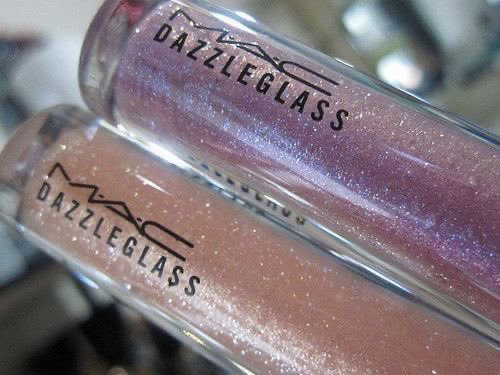

tyla also released push to start and the music video is just a work of ART. tyla has been consistently giving us hit after hit, shes so incredibly talented and i LOVE push to start. i love the choreography also, but something that i love the MOST about this music video is the fashion like HELLO?? tyla rocked tiny tops and big boots in this music video and im lowkey living for it. the fringes in her tiny top in the opening scene, her teensy denim shorts that she leaves unbuttoned to show off her blinged out panties like YES.
THE ADVICE COLUMN ;
Hi! Question for the advice column. I'm going on a trip for my birthday to a retreat, with a group of 10 friends in a couple of weeks. It's only 3 days but I am so excited. I am in a part of the world where it's summer right now, so my question is: what are your essentials for a summer trip? Swimming gear, accessories, skincare etc, I'm planning all my outfits in advance, so any advice is appreciated. Thank you! 𐙚˙⋆.˚ ᡣ𐭩
❤︎ SPF (between 30-50)
❤︎ lacy/frilly bikinis and swimsuits. they make u look like an absolute beach doll 🍬✨
❤︎ a yummy body butter + body shimmer (during the summer, we show lots of skin so its important to stay moisturized like a glazed doughnut and also to sparkle like the star u are)
❤︎ as for clothing i typically opt for tube tops, mini skirts, sundresses and things of that nature. i LOVE summer fashion
❤︎ blinged out water tumbler for fashionable hydration 💦 and ofc a portable mini fan


Do you know how to make yourself look more exotic/tropical in appearance? Like I want to look like a tropical mermaid - cotton candy doll
❤︎ use a bit of shimmery bronzer on ur cheekbones and collarbones to achieve that glowy sun kissed look
❤︎ when i think of cotton candy key west kitten doll i think of BEACHY WAVES and bubblegum pink lips so braiding ur hair overnight can help you to achieve beachy waves in the morning, and invest in a bubble gum pink/glossy coral colored lipgloss (i recommend candy baby 🍭 from victorias secret)
❤︎ use fragrances with notes of fruit and coconut
NOVEMBER TRENDS ;
one of my favorite trends this november is the women in male dominated fields trend. its been all over my tiktok and essentially the trend is just women behaving the way many men of today behave towards women and giving them a taste of their own toxic medicine.


this trend reminds me a lot of ciara's song "like a boy". some of my FAVORITE moments from this trend are as follows…💬🎀
♡ when hes pouring his heart out in front of me and i start practicing my jumpshot mid-argument
♡ when hes got tears running down his face explaining to me why my actions hurt him but i just ask him "why are u with me then" and carry on with my day
♡ when he catches me in a lie but i just hit him with the "alright believe what u want"
this trend puts into perspective the toxic and dismissive behaviors that are becoming more and more common and that are normalized in relationships, now that the roles are reversed. it also serves as a reminder of how important mutual respect and empathy are in any relationship.
#honeysitgirlmagazine✨💝#honeytonedhottie⭐️#it girl#becoming that girl#self concept#self care#that girl#self love#it girl energy#dream girl tips#dream girl#dream life#dreamy#hyper femininity#hyper feminine#girly#girl blog#it girl magazine#it girl lifestyle#it girl journey#princess#dolly#fashion#passion 4 fashion#girly magazine#monthly catalogue#txt#new years prep#planning#productivity
475 notes
·
View notes
Text
I have added English subtitles to this video posted by Helena Sotoca on Instagram. She's from Madrid (Spain) but has been living in Catalonia for 7 years. As she explained in another video, she didn't learn any Catalan the first 3 years she lived here, but then realised how she was imposing Spanish on her group of Catalan friends and how important it was for her friends to keep their language, so she learned it. She is very happy about this decision which has allowed her to integrate more in Catalan society and culture.
In this video, she gives her personal opinion on why languages are not only "a way to understand each other". This sentence is something that we speakers of discriminated languages have to hear all the time (in fact, I was reminded of this video a few days ago because @beautiful-basque-country got that comment). Many times, they'll say: "why are you so annoying about wanting to be able to speak your language? A language is only a tool to understand each other, so if you speak both [the local language and the imperial language], why not just always speak [the imperial language]?".
This mindset is what leads to language extermination. First of all, because it assumes that our languages are less worthy of existence and thus that the language's community is less worthy of existence. If I stop speaking my language, I stop being a part of me. If all my culture stops speaking our language, we stop existing. Language is deeply tied to culture, it's through language that we think and transmit our worldview, and there are many aspects of our culture and our landscape that we can only describe in our language, because only we have the specific words to describe it or because the translation loses nuance, context, and connotations. Remove language, and the rest of the culture will soon follow.
Secondly, it erases the reason why we speak the state's language, which is usually because of imposition through violence, and justifies this imposition because the imperial violence of the past that made the imperial language more widely spoken is now the reason why speakers of the imperial language deserve more rights than those who suffered the imposition.
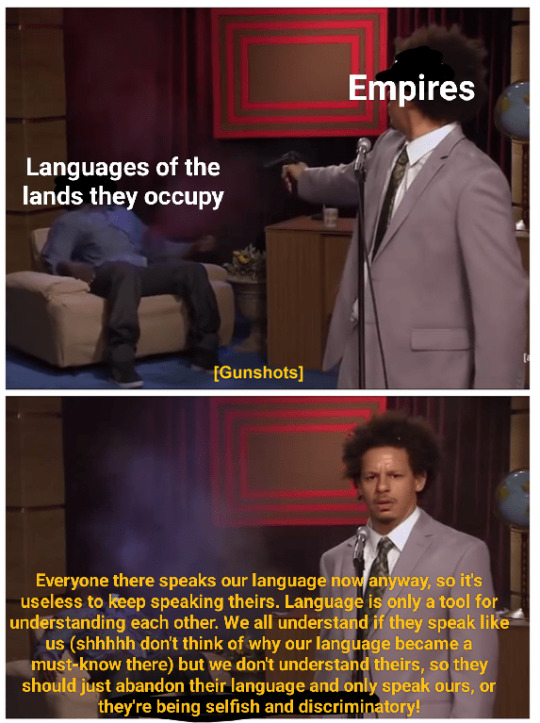
But besides these more social reasons, I like how Helena explains her personal relation to the language in this video. She also shows us one of the reasons why it's so important to promote discriminated languages to be used in public (and not only hidden at home): when you meet someone speaking a language, you form a bond with them in that language and it can be difficult to change. Speakers of minoritized languages often meet each other in contexts in which they're socially pressured to speak the state's language, and so we find the situation where a group of friends who are all native speakers of the minoritized language will form a bond in the state's language. Thus, slowly, because of the state's language imposition in the public sphere (this is what the "speak the state language if there's even 1 person who might not speak the local language! Languages are only a tool for communication!" mindset pushes us to), the local language gets pushed aside more and more, until we can't have a normal life in it and the state's language imposition becomes absolute, and the local language dies, taking with it its culture, history, and connection to the land and ancestors.
With some work, it can be reversed. I've explained this before but I'll say it again because it's relevant. My parents met in Spanish, because they met in high school and back then speaking Catalan in schools was strictly forbidden and punished. They were speaking in Spanish even when they started dating, but they realised how absurd it was that two native Catalan speakers spoke Spanish to each other and how it was a result of Francoist policy. They decided they don't want Francoism to infiltrate our personal lives, so they made the effort and switched. Maintaining the language of their surroundings, their culture, their land, they became even closer. And, thanks to their decision, when I was born I had the luck of being a native speaker of the language too, because it's what we've always spoken at home. But they did it because they had a political antifascist conscience, many people don't think much about it and just go with what is easier. If they had done that, the language would have lost them and also me. Multiply this for how many people meet each other in settings where social pressure or social rules promote speaking the imperial language instead of the local one that is closer to their hearts.
So no, a language is not only a tool to understand each other. It's also what allows us to speak according to our own understanding of the world (instead of assimilating into another's worldview), it gives meaning to our surroundings (both nature, the names we give to places, etc), every word is an unbroken chain with all of those who came before us, it allows us to understand our ancestors whether that be through their writing or songs they passed down or legends, it's an integral part of the human relations we establish, and so much more. Every language is worth everything. Every language has the right to exist and to thrive.
#llengua catalana#actualitat#sociolinguistics#minoritized languages#català#catalan#languages#langblr#cultures#anthropology#minority languages#diversity#cultural diversity#linguistics#lingblr#language revitalization
302 notes
·
View notes
Text
Dropping Byler Evidence Every Day Until Season 5
. ݁₊ ⊹ . ݁˖ . ݁ Day 1 - The M&Ms scene . ݁₊ ⊹ . ݁˖ . ݁

So yeah, this scene is never really talked about that much as like actual proof, more like a funni little thing where Mike looks at Will for a moment when he walks away, but analysis of the cinematography, framing and narrative of this scene can be revealing.
First thing: as soon as El wipes her nose, revealing it was her that helped Mike and Lucas, the camera zooms in on Mike, as if to be like 'oooh wonder how he's going to react'! and the audience is then in suspense, because they're probably expecting him to smile or try to take this opportunity.
What does he do? He just says 'Thanks." And the moment of suspense is broken. It's almost like a record scratch. We will come back to this reaction later, basically because it shows that Mike really does not mind being on these terms with El.
Second thing: At first glance there seems to be 3 main characters of this scene: Mike, Lucas and El. However, Will also seems to be included in this scene unlike Max who is also there. There is no reason to have Will be in some of these shots that, I want you guys to understand, is intentional. The directors didn't just accidentally set up this frame:

They didn't just forget to move Will out the way. In this shot, the Rule of Thirds can be applied. While El and half of Mike are in the second third/ third third, both half of Mike and Will are in the same third. This is also the third on the left, which is where (in western cultures) people begin to look at images from (reading from left to right). The fact that Will looks at Mike when he says 'Thanks' is the first thing that the audience is intended to notice (because its on the left), even if it is very subtle.
It is also important to note that the writers of the show know, in this moment, that Will is in love with Mike, they've had that planned out from the start (this is undeniably canon, unlike Mike's feelings to Will). Therefore, it is interesting that they included him in this shot and the next part too:

Like?? what was the point of the directors putting him in this part? Placing him in an interactional role with Mike in a Mike and El scene is just interesting to me. Like,,,, also could Mike not have talked to El with Will there?

After Will gets up, there is this really awkwardly long part where Will goes from the left third to the right third of the screen and just stays there? Like he's still in the shot (which they can easily catch and retake if they needed to). Why do the writers/directors want you to take such notice of his presence?
Also, going back to the fact that Will has to leave for Mike to be able to talk to El. Again, the directors did not need to put Will in this scene, they could have had him doing something else. Instead, they had him there to subtly further his character arc of being selfless/being shoved away by Mike in favour of El. It's also maybe simply because Mike just can't handle having both Will and El in the same context without ignoring one for the other, because he holds them to the same romantic standard.
We see this mishandling of El and Will in the airport scene, the whole time Mike is with El in the beginning of S3, Rink o Mania, the dinner after Rink o Mania etc. Basically, when both El and Will are around, he feels like he has to get rid of Will to be able to be romantic towards El, despite being able to talk about it to Lucas. When it's just him and Will, he's pretty happy (we see this in the 'Cool. Cool.' scene and the 'Guess it's up to us again' scene which are the only two scenes in S4 where Mike believes he is no longer in a relationship with El and just thinks he needs to team up with Will and go back to Hawkins without El). Therefore, he needed Will out the way because he can't be romantic with his girlfriend with Will distracting him lmao <3
Third Thing: Lucas is the one to encourage Mike to make up with El.

To be honest, him encouraging him alone isn't really that convincing of the fact that Mike is queer coded blah blah, like, your friend is allowed to say 'That was the Olive branch! Your way in!' without it being queercoding. The queercoding however, comes with the reaction to that information.
First, I want to point to something I may bring up in the future of this series. In S1, Lucas is the first person to ever suggest that there might be something romantic going on between Mike and El. When he says "Why don't you just marry her?", Mike does not go all ooooh flustery and blushy, he does not go 'EW GROSS' like a lot of boys that age would, instead he just acts confused. Multiple times.
The first time is when he goes, "Lucas what are you talking about?" The second is in response to Lucas going "Mike, seriously?" saying "What?" again. When Lucas then teases him about caring about her, he just says "Shut up Lucas" in this really tired tone, rather than a flustered or angry one. He basically gets the idea that he probably should like El romantically, if he shows even any care towards her.
Now, throughout S3, Lucas is the one to constantly question Mike's actions towards El. He's confused on why he won't tell her the truth about Hopper, and everything else, which all culminates into this "Oh my god. You're hopeless," when referring to picking up signals about girls.
I must say this rn too: You don't pick up on signals you don't want to receive. You do pick up on signals you do want to receive. I think most of us know what it's like to have a crush. You constantly look out for little things and overanalyse their actions towards you. But Mike has no clue. Maybe because.... he just doesnt feel that way.
Okay going back to reactions. Basically, you would kind of expect Mike's reaction to hearing that his girlfriend, that he's sooooo sad about losing oh nooooo, has decided to reach out and say that she's okay with him would be excitement, right?

When Lucas is describing how he's going to let Mike talk to El, Mike looks extremely nervous, which I get. It's normal to feel nervous in this situation, but the thing is, El seems okay with him, surely he would at least have a little light in his eyes?
When Lucas has to say 'Talk to her, alright?' (as if Mike has no fucking clue) Mike nods and then there is a swell in the music, the camera zooms in on him, and instead of the music swelling to some nice, positive tones, it's almost foreboding, mimicking the mixed feelings swirling in Mike's brain. His face also kind of looks.... weird like he's unsure, or maybe he's disappointed? Nervous? idk

I would understand this to be a little romantic if he smiles, but jesus, he does not crack a single grin at this part.
It almost seems like he's deciding to do something he doesn't really want to. I think he was completely content with the fact that she helped them, but didn't want to do anything about it because he's totally fine being on good terms with her, obviously, but not necessarily on romantic terms with her. Maybe he's fine with the fact she doesn't really want to be with him.
However, after Lucas says this stuff, now he's looking over at her and thinking, wait, maybe she does want to be with me.
But instead of a:
Wow, maybe she does want to be with me! :D
It's a:
Oh, so she does want to be with me.
^basically this means Mike decides, based on his encouragement from Lucas rather than his own feelings, that he should talk to her. What can he say to Lucas here? That he doesn't want to? That isn't really an option for him.
Fourth Thing: Okay this is very small but for some reason this scene is interspersed with scenes of Jonathan and Nancy getting almost killed by the mindflayer army like???
Why would they cut from this very tense scene where these beloved characters are about to be killed to this scene between Mike and El where everything is fine!
It's like.,,,, they want the audience to be tense watching them, even if it's not directly for the right reasons. They want the audience to maybe feel the tension in the foreboding nature of the fact that the mindflayer is in the same building as them, meaning there is always some danger lurking in the background.
Okay hope you enjoyed today's byler evidence :) stay tuned for tomorrow's!
#byler#byler nation#byler endgame#mike wheeler#will byers#stranger things#stranger things 5#byler evidence#byler proof#miwiheroes daily byler
222 notes
·
View notes
Text
It's wild that the whole global trend of gay-focused happy ending romance shows and movies has only been going on for *looks at calendar* a measly ten years!
Just ten years ago. 2014. That's when you get the discovery of a market for queer romance series and films with happy endings. That year the OG Love Sick in Thailand came out. Brazil puts out The Way He Looks, which deserves so much more credit than it receives for influencing the aeshtetics of the genre. Looking premieres on HBO, and although it had low ratings, it's an important touchstone. And, despite Nickelodeon’s censorship and shifting the program from tv to its website, the Legend of Korra confirms Korrasami in its season finale.
The next year, in 2015, we get Love Sick season 2, and China, pre-censorship laws has a few options: Happy Together (not the Wong Kar Wai one lol), Mr. X and I, and Falling In Love with a Rival. Canada, premieres Schitt's Creek. In the US, Steven Universe reveals Garnet as a romantic fusion between two female characters, and will proceed to just be so sapphic. Norwegian web series Skam premieres and sets up a gay protagonist for its third season, which will drop in 2016 and entirely change the global media landscape.
Then, 2016! This is the MOMENT. That aforementioned Skam season happens. Japan puts out the film version of Ossan's Love and anime series Yuri!!! on Ice. China has the impactful Addicted Heroine, which directly leads to increased censorship. The US has Moonlight come out and take home the Oscar. In Thailand, GMMTV enters the BL game and Thai BL explodes: Puppy Honey, SOTUS, Water Boyy, Make It Right, plus, the Thai Gay OK Bangkok, which, like its influence, Looking, is more in the queer tradition but introduces two dramatically important directors to the Thai BL industry, Aof and Jojo.
By 2017, Taiwan enters the game with its History series. Korea’s BL industry actually kicks off with Method and Long Time No See. Thailand’s got too many BLs to mention. Call Me By Your Name, though not a happy ending, makes a big splash that will send ripples through the whole genre, and God's Own Country offers a gruff counter-argument to problematic age differences and twink obsessions. This is also the year of Netflix reboot of One Day At a Time bringing some wlw to the screen, and the Disney Channel has a main character come out as ‘gay’ on Andi Mack ( I’m am ready to throw fists with anyone who thinks the Disney Channel aesthetic isn’t a part of current queer culture). And I'd be remiss not to mention the influential cult-following of chaotic web-series The Gay and Wondrous Life of Caleb Gallo: "Sometimes things that are expensive...are worse."
All this happened, and we hadn’t even gotten to Love, Simon, Elite, or ITSAY, yet.
Prior to all this there are some major precursors some of which signaled and primed a receptive market, others influenced the people who'd go on to create the QLs. Japan has a sputtering start in the 2010s with a few BL films (Takumi-Kun, Boys Love, and Jujoun Pure Heart). Most significantly in the American context, you have Glee, and its ending really makes way for the new era that can center gay young people in a world where queerness, due to easy access to digital information, is less novel to the characters. And the QL book and graphic novel landscape was way ahead of the television and film industries, directly creating many of the stories that the latter industries used.
There's plenty of the traditional queer media content (tragic melodramas and independent camp comedies) going on prior to and alongside QL, and there are some outlying queer romance films with happy endings that precede the era but feel very much akin to QL genre tropes and goals, many with a focus on postcolonial and multicultural perspectives (Saving Face, The Wedding Banquet, Big Eden, Maurice, My Beautiful Launderette, and Weekend). I don't mean to suggest that everything I’ve listed ought to be categorized as QL.
Rather, I want to point out how all of these new-era queer romance works are in a big queer global conversation together, in the creation of a new contemporary genre, a genre that has more capacity and thematic interest to include digital technology and normalize cross-cultural relationships than other genres (there's a reason fansubs and web platforms are so easily accepted and integrated to the proliferation of these series).
You're not too late to be part of the conversation. Imagine being alive in the 1960s and 70s and participating in the blossoming of the sci-fi genre. That flowering is where gay romance sits now. Join the party.
#just constantly gob-smacked to be alive right now#i know there's plenty of reason to be horrifically distressed about the condition of the world#queer history#thai bl#japanese bl#korean bl#chinese bl#skam
347 notes
·
View notes
Note
Even if a creator is a bad person it's still okay to like their work. People need to mind their own business.
Honestly it's not really that sort of situation. I'll actively defend Steven Moffat here.
There was a huge hate movement for him back in the early 2010s - which, in retrospect, formed largely because he was running 2 of the superwholock shows at once, one of which went through extremely long hiatuses* and the other of which was functionally an adaptation of an already well regarded show**, making him subject to a sort of double ire in the eyes of a lot of fandom people. Notably, his co-showrunner, Mark Gatiss, is rarely mentioned and much of his work is still attributed to Moffat (and yes, this includes that Hbomberguy video. Several of "Steven Moffat's bad writing choices" were not actually written by him, they were Gatiss.)
People caricatured the dude into a sort of malicious, arrogant figure who hated women and was deliberately mismanaging these shows to spite fans, to the point where people who never watched them believe this via cultural osmosis. It became very common to take quotes from him out of context to make them look bad***, to cite him as an example of a showrunner who hated his fans, someone who sabotaged his own work just to get at said fans, someone who was too arrogant to take criticism, despite all of this being basically a collective "headcanon" about the guy formed on tumblr. Some if it got especially terrible, like lying about sexual assault (I don't mean people accused him of sexual assault and I think they're making it up, I mean people would say things like "many of his actresses have accused him of sexual assault on set" when no such accusations exist in the first place. This gets passed around en masse and is, in my opinion, absolutely rancid.)
On top of that a ton of the criticism directed at the shows themselves is, personally, just terrible media criticism. So much of it came from assuming a very hostile intent from the writer and just refusing to engage with the text at all past that.
Like some really common threads you see with critique of this writer's work, especially in regards to Doctor Who since that's the one I'm most familiar with:
A general belief that his lead characters were meant to be ever perfect self inserts, and so therefore when they act shitty or arrogant or flawed in any way, that's both reflective of the author and something the show wants you to view as positive or aspirational.
An overarching thesis that his characters are "too important" in the narrative due to the writer's arrogance and self obsession (even though this is a very deliberate theme that's stated several times)
A lot of focus on the writer personally "attacking" the fans or making choices primarily out of spite.
A tendency to treat the show being different to what it's adapting as inherently bad and hostile towards the original.
Just generally very little consideration and engagement with the themes, intent, etc. of the shows
This one's a little more nebulous and doesn't apply to all critique but a lot of it, especially recently, is clearly by people who haven't seen the show in like 10 years and their opinion is largely formed secondhand through like, "discourse nostalgia". Which. you know. bad.
I think these are just weird and nonsensical ways to engage with a work of fiction. I also think it's really sad to see the show boiled down to this because that era of who is, in my opinion, very thematically rich and unique among similar shows, and I'm disappointed that it's often dismissed in such a paltry way.
This isn't to say people aren't allowed to critique Steven Moffat or anything, but the context in which he basically became The Devil™ to a large portion of fandom and is still remembered in a poor light is very tied to this perfect storm of fan culture and I just don't agree with a ton of it.
* I'm sure most people have seen the way long running shows and hiatuses will cause people to fall out with a show, with some former fans turning around and joining a sort of "anti fandom" for it while it's still airing. That happened with both these shows. ** Doctor Who will change it's entire writing staff, crew, and cast every few years, and with that comes a change in style, tone, theme - the old show basically ends and is replaced by a new show under the same title. As Steven Moffat's era was the first of these handovers for the majority of audiences, you can imagine this wasn't a well loved move for many fans. *** I know for a fact most people have not sought out the sources for a lot of these quotes to check that they read the same in context because 1) most of them were deleted years ago and are very difficult to find now and 2) many of them do actually make sense in the context of their respective interviews
#and yeah i think the hbomberguy video is kind of bad#I can pull up examples but a lot of what he's saying is very rooted in this sort of critique#maybe most egregiously he sometimes just explains something very poorly or outright incorrectly to make it seem worse or more nonsensical#ex. saying a scene in doctor who 'steals a huge chunk of the plot' when it's less than 30 seconds long#saying two characters randomly start hanging out again while not mentioning the episode entirely dedicated to this#or the way her decision to keep hanging out with him is the emotional turning point of the entire season#etc etc etc.
501 notes
·
View notes
Text
It feels like there's this narrative that fandom keeps wanting to explore, with Steve Harrington, about this very specific type of martyrdom where self-sacrifice is an expression of a lack of self-worth. And, like, yes, write the narrative that's meaningful to you, and yes ok Steve does admittedly get beaten up a lot, but -- legitimately I do not think this narrative is actually Steve's story.
Like, without gendering things too much, there is something in the Steve fanon that I keep seeing that's so reflective of the specific kind of sacrifice and societal pressures exerted on girls, specifically -- this story of 'you make yourself worthy and worthwhile by carving pieces out of yourself', of believing that you must always give and never receive to justify the space you take up in the world. Yes, boys can experience this same pressure (and obviously trans and nb people of all genders run into it as well! sometimes a lot!), but especially in the mid-1980s cultural context where Stranger Things takes place, it's just...really not likely to be a dominant narrative for Steve to be operating under? It doesn't even really match the Steve we see on screen -- who is happy to make sacrifices for the sake of others, yeah, when needed, but who's not particularly kind or giving unless somebody asks first.
And Steve does get hurt a lot on other people's behalf! And this is a problem! It's just a completely different problem than the one fandom keeps writing.
Steve, and I'm going to say this forever, is a story about toxic masculinity, which the show may or may not even know it's writing. The archetypes influencing Steve's character as it shows up on the screen (and the stories and messages that Steve would actually be surrounded by in his actual life) are not deconstructions of suffering heroes who never should have had to fight in the first place and were destroyed by it. That's the Buffy the Vampire Slayer story. Steve's not Buffy. Steve's cultural context is Indiana Jones.
Steve is The Guy! And part of being The Guy is that you're expected to take the hits -- not because Steve is less important than the women-and-children he's supposed to protect, but because, the story says, he will get less hurt. Why should Steve get in between Billy and Lucas? Because Steve is an eighteen-year-old athlete and Lucas is in middle school, and of the two of them, Steve actually stands a chance. (And yes, Steve got badly hurt there, and Max had to save him -- but if Lucas, if Max had taken that beating they would not have been running through those tunnels later.) Was somebody else better-qualified to dive down to the uncertain bottom of a cold lake in the middle of the night? Steve doesn't list his credentials there as a way of justifying some ideal of martyrdom; he is literally the most likely person on the boat not to drown.
And make no mistake: when Steve's pulled into the Upside-Down, he survives the bats long enough for backup to get there. Realistic or not, he's apparently tough enough that he's physically capable of hiking barefoot through hell without much slowing down. Steve is the tank for the same reason as any tank: because he literally has been shown to have the most hit points in the group. You cannot honestly engage with Steve in this context without dealing with the fact that he's right.
AND THIS IS A PROBLEM! This is still a problem! But it's not the same problem that fandom seems to expect. It's not an expression of caretaking or the need for self-sacrifice; it's not an issue with Steve valuing himself less. It's an issue of toxic masculinity so ingrained that Steve doesn't even recognize he's suffering from it, because one of the tenets of toxic masculinity is that Big Strong Guys don't suffer. It's just a concussion, it's fine, he'll walk it off. It's not that Steve thinks he deserves to get hurt, or even that he's less deserving of safety than the others. It's that absolutely nothing in his cultural context allows him to admit that he can be hurt in a significant way.
There's still so much tension that can be gotten out of this situation, I swear. There's so much that can be explored in writing! Hell, the show itself is deconstructing some of this trope, believe it or not, by giving us a Steve who absolutely can take all the hits thrown his direction but still doesn't know what the fuck he's doing with his life. It turns out that doing his job as The Guy is only mildly helpful in horror movie situations (mostly by buying time for smarter, squishier people to do the damage from behind him), and somewhere a little worse than useless in everyday life.
But Steve does not go out of his way to self-sacrifice, he really doesn't. He just does his job. He's The Guy. Of course he's not going to let a kid or a girl or some scared skinny nerd who just learned about monsters yesterday take the hits. Of course Steve's got this.
#Stranger Things#do I dare character-tag this#does this count as an Unpopular Opinion if I'm calling out fanon#eh let's be bold#Steve Harrington#and#toxic masculinity#which is apparently just A Thing I Post About Now
2K notes
·
View notes
Text
AmazingPhil channel marathon musings
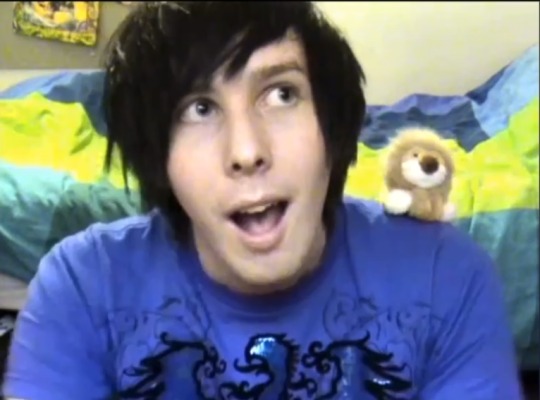
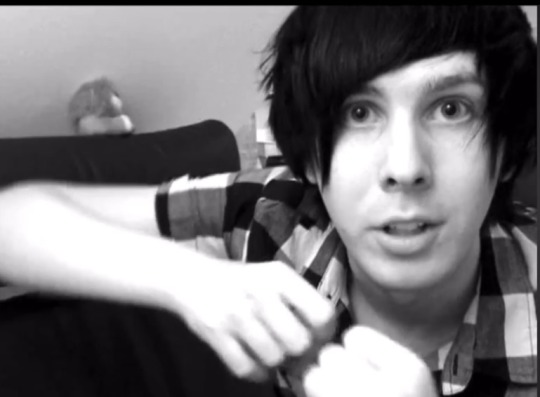
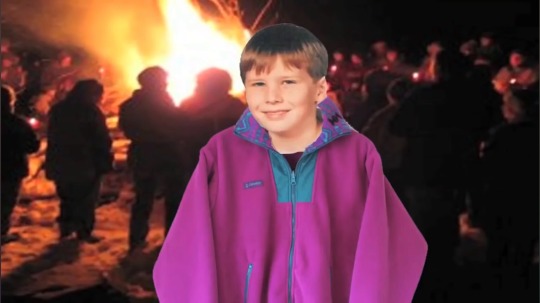
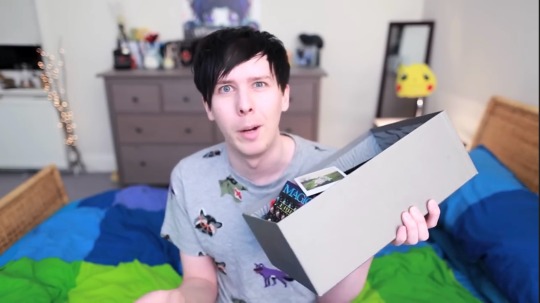

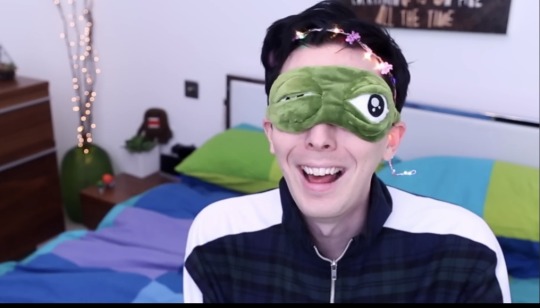
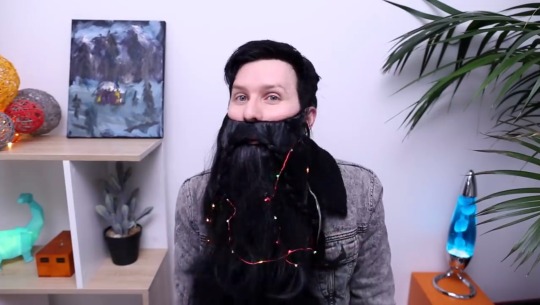
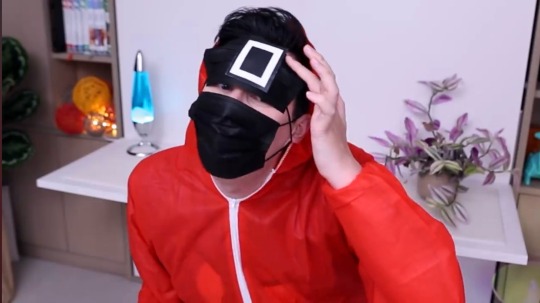
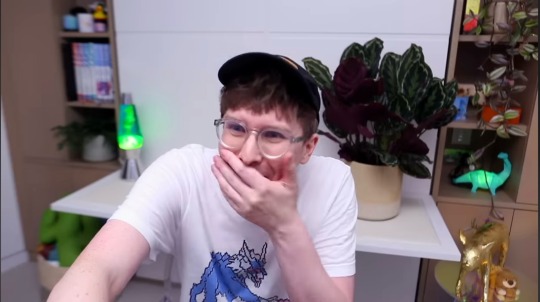
during a pre-show q&a back in november, in response to a question about what show someone should binge next, dan said they should watch all of the AmazingPhil channel from the start. I was not the person who asked this (nor was I at this show), but regardless I did decide I wanted to take dan’s suggestion seriously. just a few days ago, I finished watching all of AmazingPhil in chronological order. and now i really want to talk about what it was like and why I would recommend marathoning his channel to pretty much anyone—because it was a blast.
I watched all of the 369 currently public AmazingPhil videos over the course of 35 days, which is from my perspective a pretty casual marathon. 369/35 = roughly 11 videos a day, though due to algorithm and monetization policy stuff, phil’s videos became longer in duration around 2015-2016; for many years, most of his videos were around 4 minutes long or less, which for me meant that early on in this marathon I was watching more videos per day, and then later on my pace slowed. phil’s videos with dan are usually pretty long as well, so if I had something like a baking video or wdapteo up next to watch, I might have only watched one or two videos that day.
unsurprisingly, watching all of phil’s videos in order in a relatively short span of time gave me a really cool perspective on how phil has grown as a person and as a YouTuber over the past eighteen years. surprising to me, though, was how I felt like watching his channel in such a linear way felt a bit like coming to know who phil is for the very first time, again. despite having watched his videos for over a decade, i feel like i understand his style and creativity and personality more fully, and in general better, than I did before. watching 2007 phil become 2009 phil become 2011 phil and so on in the span of a few days or a week meant seeing clearly how his sense of humor evolved, how his editing and creativity developed, how his perspectives on life and relationship with his audience shifted. much as when you binge an entire tv or book series and immediately afterwards feel like you’re brimming with information, and have all the context, that’s sort of how I felt. and it was new for me because I’d never done that with phil’s content before—I’d never followed the course of his life the way you might a fictional character’s.
AmazingPhil is also an incredible capsule of 2000s, 2010s, and 2020s Western internet culture, obviously. it’s like an anthropologist from the future with a very hyperspecific thesis topic’s dream treasure horde. what a person can learn about one corner of the world, and one corner of society, from AmazingPhil’s videos is, well, a lot. I see so much cultural value in AmazingPhil, it’s insane. his videos are not sketches, essays, and commentaries on society and life like Dan’s, but I’d make the argument (as I’m sure most of you would) that they’re just as important and critical to helping people understand themselves and the world they live in. and the kind of people they want to be, too, perhaps.
there were also certain videos that stuck with me more than they had in the past. I discovered new favorite videos and videos that I considered more interesting than I previously had. (I tried just now to make a list of some of these but it rapidly got too long, so instead I’ll restrict myself to mentioning only one, a new favorite, from 2021: “I Got Catfished.” - which i think is a fantastic example of phil’s storytelling style). dnp have both said before that they view life as a performance – and phil is without a sliver of doubt a magical and incredible performer. he knows so well how to tell stories with words, pacing, structures, and effects that are hilarious and entertaining; he turns anecdotes from his life into these amazing whimsical pieces of art made in a way no other person has ever made things. YouTube has from the beginning presented him with the perfect way to be creative in a way that suits him. and more than that, i found that it was never even remotely unpleasant to watch his videos every day for over a month. there is simply not an AmazingPhil video that doesn’t bring me joy and make me sit there smiling like a fool. my cheek muscles are probably stronger than they were 35 days ago.
so, to you I say, go: watch all of AmazingPhil, draw your own conclusions from his current oeuvre and deepen your parasocial relationship with Phil Lester in ways you cannot yet comprehend. I really recommend.
(final notes: one side effect of watching all of phil’s videos was being unexpectedly yet thoroughly convinced he does indeed possess psychic talents. even though i don’t believe in magical anything, i do now believe phil lester inherited prescience from his grandmother.)
(also dan is completely right that every time phil changes his hair, he regenerates into an entirely new man.)
(also also I made an AmazingPhil spotify playlist that is highly specific to my music tastes but that anyone is welcome to listen to all the same) ✨🐗💙🥱
#if i'm honest sharing my thoughts about dnp like this makes me anxious i am a lurker and a fic writer at heart so#if you disagree with my thoughts simply do not let me know#but also if anyone wants to talk about this or other dnp topics feel free to dm anytime :>#phil lester#amazingphil#dnp#dan and phil
115 notes
·
View notes
Text
Organ donation, compassion fatigue, and Japanese perspectives on brain death
I don’t think Shidou’s sin was actually a crime (as in, it was perfectly legal) and I’m going to explain why. This is essentially a very long Kirisaki Shidou Is Not An Organ Harvester post
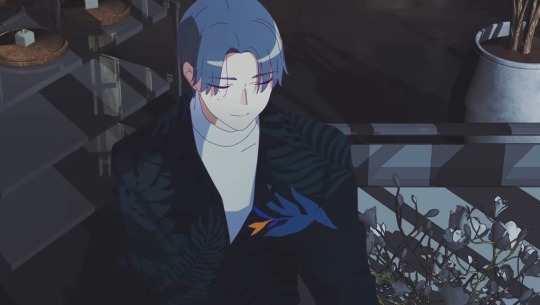
To start: Shidou’s sin was convincing the families of braindead patients to donate their relatives’ organs. He confirms doing this in his T2 voice drama, and the way he words it makes it clear he thinks of it as murder. (He does say that this is only half of his sin, but we’ll get to the other half later.)
You know, I… continuously tried to persuade the relatives of braindead patients who were against organ transplants.
“In order to save the life of someone you don’t know, please let me kill your family member,” I told them.
It doesn’t even take much thinking to realize how cruel that is, but… I didn’t realize that until the very end.
Translation used: https://youtu.be/9xmokVJ-6x4?si=VgcIp5LCdNnUwqUW
Brain death is the irreversible, complete loss of brain function, meaning there’s no chance for a braindead patient to ever come back. Because of this, some people may feel that removing life support from a braindead patient doesn’t constitute murder. It definitely doesn’t constitute murder from a legal perspective, but it makes sense why someone might think of it as murder— especially in Japan.
Japanese perspectives on brain death
In evaluating Shidou’s case, we have to consider the cultural context within which it was written. Many people in Japan do not consider brain death as human death, and brain death cannot be declared without consent from the family and the intention to donate organs. In fact, braindead patients are not removed from life support until their heart stops beating. Shidou isn’t being dramatic when he frames his words as basically saying, “please let me kill your family member.”
Brain death is a very contentious topic in Japan—Doctors are put under scrutiny for declaring brain death and performing organ transplants. It’s important to know that in Japan, brain death only exists in relation to organ transplants. And only certain designated hospitals will do this. Even more so, if a person writes an advance directive asking to be taken off of life support in the case of brain death, doctors are not required to follow it. And many of them don’t, out of fear of the patient’s family lashing out at them.
Only in 2010 was Japan’s Organ Transplant Law revised so that organ transplants could be performed without prior consent from the brain dead patient (now only requiring consent from the family).
Here’s a couple of scholarly articles on the topic if you’d like to read more about it.
https://doi.org/10.1186%2Fs12910-021-00626-2
https://doi.org/10.1353/nib.2022.0019
Another very important facet of this discussion is how low organ donation rates are in Japan. To give you an idea, here’s a chart showing the per million population of donations after brain death (DBD) and donations after cardiac death (DCD) in a few different countries.
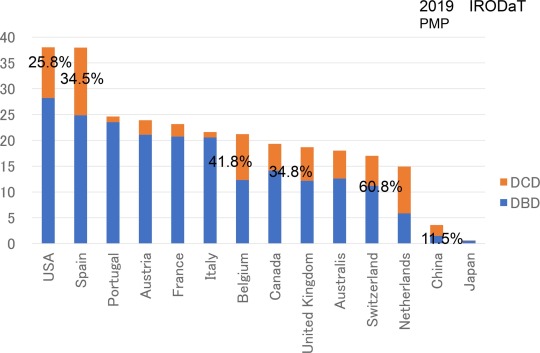
Sourced from this article, which has some other interesting statistics as well: https://doi.org/10.1016/j.tpr.2023.100131
As you can see, Japan’s rates are astronomically low in comparison to other countries. This helps to contextualize why Shidou had to try so hard to persuade families to donate, and why he later became extremely desperate when his wife’s life was on the line.
I’ve seen a lot of people confused about Shidou’s crime, and many speculations about him doing heinous things such as organ harvesting or purposefully botching surgeries—but I think this is because we’re approaching the case with a western perspective. As we know, many (if not all) of the Milgram prisoners represent a controversial social issue. Brain death is not nearly as divisive in western medicine as it is in Japan, so it’s easy to overlook the idea that all Shidou actually did was take organs from braindead patients. Perspectives on brain death in Japan have changed a lot in the past couple of decades, but it’s still quite controversial; because of this, I truly believe that this is the point of contention behind Shidou’s case, and there’s nothing more sinister secretly going on.
Compassion fatigue
Compassion fatigue is commonly thought to be the manifestation of secondary traumatic stress and burnout, caused by caring for others who are in stressful situations. This commonly affects people who work in healthcare.
I believe Shidou experienced compassion fatigue from working in the hospital, as he exhibits some of the symptoms—in particular, a reduced sense of empathy and a detachment from others.
I feel that Throw Down makes a lot of sense when you view it from this angle.
Lyrical analysis on Throw Down
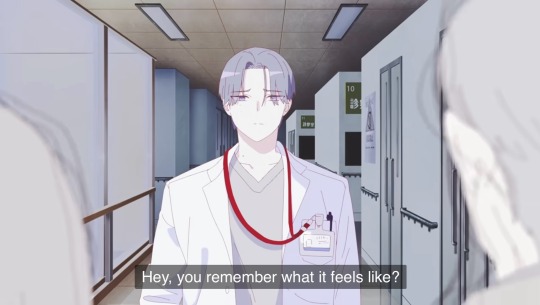
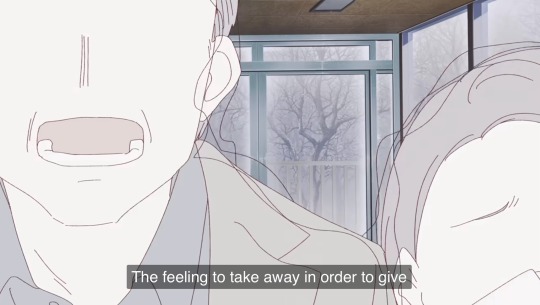
Shidou expresses that he no longer remembers what it feels like to take away in order to give.

Pomegranates represent death in Greek mythology, and I believe that’s what they represent here too. Shidou has become desensitized to death; the pomegranate no longer has any flavor.
If it’s not needed, I’m not interested
Shidou only thought about what was physically necessary to keep a patient alive, and remained emotionally distant.
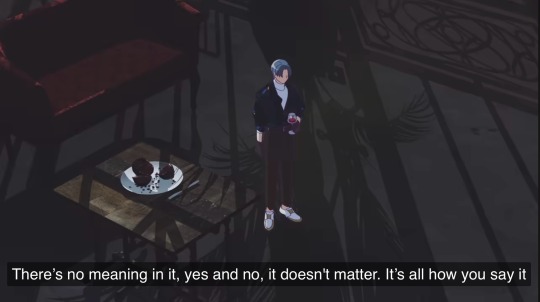
They’re dead either way, so it doesn’t really matter to him.
Now slowly close your eye, put your regret on display
Wish for being there for someone
With the same expression no matter who comes
This is the part that most makes me think of compassion fatigue—Shidou had difficulty expressing empathy for grieving families and had to fake it.
I don’t feel scared because I don’t know
Shidou didn’t understand what it was like to be in that situation. But now that it’s happened to him… he understands. And, looking back, he understands how unkind he had been about all of it. This is why he considers himself to be a murderer, why he truly believes that he has killed many people.
Ethics is a delusion
This is a line that definitely struck me as odd for awhile, but I think it makes sense in the context of his situation. His sin was not illegal—but is it ethical? That’s what all of this—whether you forgive him or not—hinges on.
The other half of Shidou’s sin
Going back to what I said earlier, Shidou’s sin wasn’t only convincing families to donate their relatives’ organs. His sin is also transplanting his son’s organs in an attempt to save his wife.
I believe that Shidou’s family got into a car accident, which resulted in his older child experiencing brain death and his wife being left in critical condition (and the younger child presumably died immediately). Considering the views surrounding brain death in Japan, it would have been difficult to find a donor, so Shidou became desperate enough to transplant his son’s organs. Since he’s the father, there wouldn’t have been any issues with receiving consent for the transplant.
Some people believe it’s the other way around—that he transplanted his wife’s organs into his son—but I believe otherwise, for multiple reasons.
In Shidou’s T1 voice drama, he expresses relief at the fact that his judgment is being determined by Es, who is a child. This makes sense if he feels that he killed his son.
Instead of being told by the law that I won’t be forgiven, I wanted a child like you, Es, to tell me that.
I feel sorry that you had to be given this role. And, I truly apologize for being so insistent about sentencing me to death as well… But, you’re perfect. You’ll give me the ending I’m most suited for.
Translation used: https://youtu.be/C4MiQ3V3YjQ?si=hPmlUkc6BfdcacNg
Additionally, a few scenes in Triage…
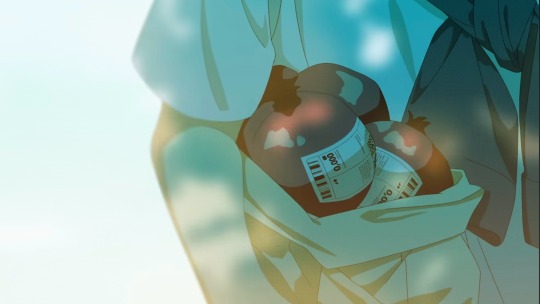
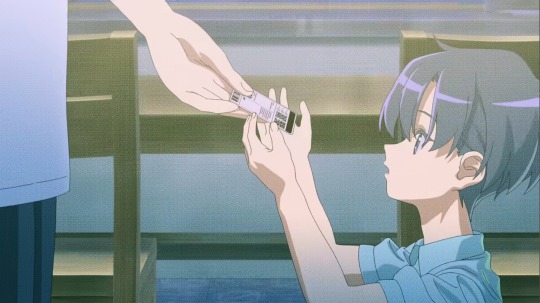
As stated before, I interpret the pomegranates to represent death. Shidou brings home three pomegranates, one for each of his family members. He later hands his son a price tag from the pomegranates—a representation of Shidou sentencing him to death.
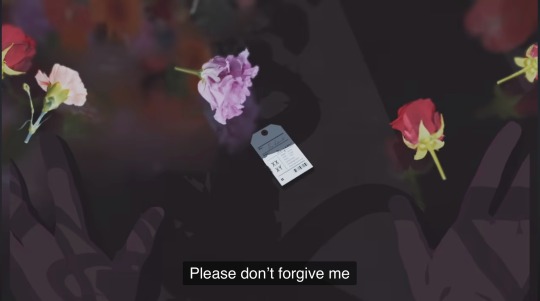
And at the end of Throw Down, an organ tag falls out of the flower person. The name seems to read “Rei Kirisaki” and has XY marked, probably indicating that the donor is male.
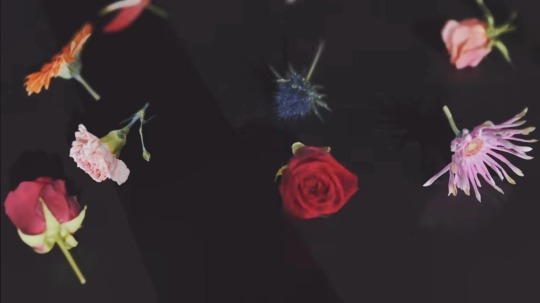
Not to mention, it’s much more plausible for the flower person to represent Shidou’s wife rather than his son. When the person falls apart, there’s a shot of a red rose—the flower most known for representing romantic love—falling out of them.
Final thoughts and conclusion
To summarize: Shidou used to routinely try to persuade the families of braindead patients to donate their relatives’ organs. Despite that the prevailing thought in Japan is that brain death is not human death, Shidou did not think of it this way.
Shidou’s family later got into an accident; he transplanted his braindead son’s organs in an attempt to save his wife, but it was a failure, resulting in her death. This situation made him reflect on his past actions—he did not consider it murder before to discontinue life support on a patient, but now that he did it to his son, his perspective has changed. Everything he has done is within the confines of the law, but he is now burdened with immense guilt and thinks himself a murderer. Not just in regards to his son, but to all of the patients that he had pulled the plug on.
Side note: I don’t think having low empathy is inherently a bad thing (I have naturally low empathy), but in this context it would make sense for Shidou to feel bad about lacking empathy.
Side note 2: Shidou is a surgeon, so it is entirely possible he personally performed the transplant on his wife. Operating on family members isn’t illegal or anything, but is widely considered to be unethical and not really a good idea.
Well, that’s all I had to say—Feel free to either add on to this theory or debate me on it. This post ended up quite long, so thank you for reading!
216 notes
·
View notes
Text
𝙱𝙶𝟹 𝙻𝚊𝚍𝚒𝚎𝚜 ✿ 𝙿𝚛𝚊𝚒𝚜𝚎 ✿
Note: I am still writing A Certain Hunger but I have been very scared about publish it because it has taken so long to write because of some personal issues with my family and work! I hope you like my headcannons about Bg3 woman. They have infested my brain 😵💫

Lae’zel
-Not one to really give or receive praise in a context outside of battle.
-She would compliment you in her husky tone occasionally if you did impressive work against an enemy. But praise for being around? No.
-Lae’zel grew up in a culture that refuses kindness or praise. “It only makes us slower. We think of our greatness more than being great; I will not fall for that. I know my greatness in the screams of my enemies.”
-However, over time, and after being introduced to Faeyan culture, she slowly learned that praise was judged as encouragement or care for others. Especially after staying with you to choose her future, she learns the importance of praise but uses it very sparingly.
-“You did well.” She would say after you kill some goblins. Or the time she mentioned that she liked the “strength” you showed when you got beaten to your last hit point.
-She was never good at taking praise. She didn’t like being called a good girl; it implied you were superior to her somehow, and she didn’t like being called anything other than Lae’zel.
-“Champion, You were so strong tonight. It made me shiver.” You told her once as she was sharpening her sword. She stops abruptly and stares ahead of her momentarily, and she starts sharpening again. She got flustered very easily with those words.
-She does say in sex, though, “You take me so well, my scent still on you from last time. Screaming you are mine.” To you in sex. She likes to praise your good behavior as her mate, but she doesn’t think it is praise. She is stating a fact. You were good at taking her????
-She isn’t the best at giving or taking praise, but nothing is better for her when it is earned. She loves to hear your approval of her, and she tries her best to do the same for you because beneath the coldness was someone who couldn’t imagine a world without you. Didn’t want to.
-I believe after the end of Act 3 in the game, she would call you “good girl” if you told her you liked it and explained how it made you feel. She won’t develop it independently, even with how well she knows you, but she wants to make you feel good. She isn’t above proving herself to you or changing small things, like what to call you in bed.
Karlach
-Fucking loves it and loves giving it both.
-She calls you baby (girl or boy) whenever she is pleased with your behavior, and she kisses you whenever the urge comes over her, which is a lot.
-Karlach has no shame or embarrassment to praise her beautiful Girlfriend.
-Karlach had helped you once with her strength; you had asked them to hold you up as you wanted to grab a honeycomb. Her solid and big hands grabbed your waist gently and lifted you up like you were nothing; it made you feel flustered and turned on.
-“Gods, I don’t think I have ever met anyone as strong as you, Karlach! That was amazing!” You said without a filter when your feet met the ground again. You looked up to the now-flustered barbarian. “Seriously,” you say as you touch her bicep innocently to investigate your girlfriend's muscle, “What were you fed as a child? Rocks and nails?”
-Which ended up with you pushed against that tree and fucked beyond belief.
-The night came over you that night under the tree. You lay naked in the grass with Karlach. You hear the turning of mechanical parts in her chest as you look up at her, resting your chin on her breast, “You are so beautiful. It is just a privilege to love you, Karlach. Truly, I can’t believe we haven’t known each other longer for how much you have taken from my heart.”
-Karlach is a soft girl sometimes, and saying something like that to her would make her stare at you with tears in her eyes. She softly cries, not believing what you are saying. She chuckles at her own tears at such a nice thing. She sniffles and says, “Thank you, baby, I can’t- ah, I can’t find the words to tell you how much that makes me feel. I love you. You are the best love I have ever known.”
-You kiss her skin softly as you cuddle closer to the tearful tiefling, “I love you too. So greatly… it’s good to know it is mutual.”
-“It is, baby, it really is. Tonight is such a beautiful night.”
Shadowheart
-Shadowheart doesn’t admit it, but she has such a big praise kink.
-It started when you two met when you noticed how she would look away when you thanked her for saving you, or she would blush when you told her how great she was beside you in a fight.
-But she was slow with her love and couldn’t be won over with some simple praise. It takes time to win her trust, let alone her heart.
-She finds her need for your praise as something she needs to hide. It was a vulnerability to exploit if she let it show. It is how she is used to being. She tries to hide her happiness with praise, but it is hard.
-But, when you two start seeing each other seriously, she takes that shit to the heart every time.
-“Good girl.” You said in passing when she healed you without being asked. It caused her to blush and feel a heat wave through her.
-She was happy to make things easier for you when she was in love with you and away from Shar. She doesn’t need anyone's approval anymore, no more sacrifices to be enough. She was enough to you. It made her feel comfortable.
-Shadow wasn’t scared to praise you back. She is similar to Karlach in that way. She has no shame when she is happy with you to tell you that or give you a look that communicates that she will treat you to something more.
-One night after she had abandoned Shar, she was still very lost and felt not herself. Even her hair isn’t the same as what she remembered. She didn’t remember much. It killed her, and you came to your shared tent.
-“Shadow, I want you to know I haven’t met someone with so much bravery before.” You say to her as she sits across from you, saddened and quiet, and you come closer to her. “You were scared and did what you thought was right, and it was right, without knowing how it would end up. You dared to do something that terrified you. It inspires me, my love.” You finish as you touch her hand, you move a hair out of her face that still looks at the ground. She had red cheeks, and her breath was hitched. She needed to hear that. But she couldn’t find words to speak. “My brave cleric.” You say as you touch her cheek tenderly with a finger, rubbing it up and down and moving it away. “I think you will find your nerve again. Give it some time.”
-She, of course, finds it again and is her typically goofy brooding self again. And she remembers those words when she is afraid. She reminds herself that you find her brave, so she must act bravely.
-The praise you give her keeps her sane even if she will never admit it.
Minthara
-Praise is not something to take or give lightly to Minthara.
-Minthara is 230 years old (45ish in human years), and you are way younger than her by a hundred(s) of years. She sees you as someone who has yet to mold into a fully well-rounded person, and she likes to see herself as some kind of mentor and lover.
-Minthara smirked at you when you did something she liked in the company of your party; she would back you up on almost any decision you made. If you kill or attack someone without asking questions, she will give you a nod and a “Good kill.”
-Minthara doesn’t hate when she is praised by you. It gave her a reasonable confidence boost that she needed right now. But she scoffs at it and doesn’t like overly affectional praise or one that doesn’t feel earned.
-She thinks the best praise is in sex with your moans and begs to her. She worships you, eyes devouring you as much as her mouth did to your clit. Her fingers toying and occasionally pinching your nipples, she moans into your body as she tastes your essence. She loves hearing how good she is doing and how great you feel; she keeps her path of getting your cum on her lips.
-Minthara kisses up your body when she is done. She links her hips with yours with firm thrusts against you, and she says down to you, “Good girl, that’s right, move with me.”
#bg3#bg3 x reader#baldur's gate 3#minthara x reader#Shadowheart x reader#Lae'zel x reader#Karlach x reader#Shadowheart#Shadowheart x tav#minthara x durge#shadowheart x durge#lae'zel x tav#Lae'zel#Lae'zel x durge#Minthara x tav#karlach cliffgate#karlach#Karlach x tav#Karlach x durge#minthara baenre#lae'zel of k'liir
646 notes
·
View notes